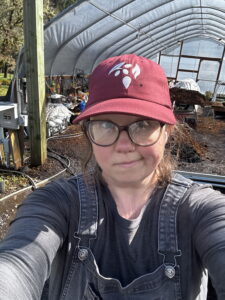About Becca
Ecological Horticulturist, Designer, & Grower

After two decades as a graphic designer, I made the decision to shift my focus from visual design to living design — from pixels to plants. That journey led me back to school, where I earned a degree in Horticulture from Oregon State University, and eventually to the founding of Urban Genesis.
Today, I work part-time with Doak Creek Native Plant Nursery in Eugene, Oregon, where I grow and care for native plants and collaborate closely with the nursery’s owner. My own work with Urban Genesis is focused on ecological consultation, landscape design, and custom plant growing, all tailored to the unique challenges and opportunities of urban environments.
A Design Philosophy Rooted in Ecology
Urban Genesis was born from a simple but powerful idea: small, intentionally designed plant communities can function like ecosystems. When we design with the relationships between plants, soil, wildlife, and humans in mind, we create spaces that are beautiful, low-maintenance, biodiverse, and resilient.
Unlike traditional landscaping, my work considers not just what plants look like — but how they live, interact, and support life. I take into account soil health, water dynamics, site-specific conditions, and the realities of the urban environment, including heat reflection, compacted soils, and altered hydrology. The goal is to help people build landscapes that are not only functional and attractive but that also increase biodiversity and improve ecological health.
Custom Growing for Purposeful Planting
In addition to design and consultation, I also grow a curated selection of plants that I believe are ecologically significant for urban landscapes. Many of my clients come to me when they need plants in specific sizes, quantities, or seasonal availability that can’t be found at most nurseries.
Whether it’s a full site consultation or a few flats of hard-to-find natives, my work is grounded in the belief that humans are keystone species — capable of shaping their environment in ways that support the greater ecological web.
Work with me!
Whether you need a design, consultation, or custom-grown plants, I can help you build a thriving, ecologically sound landscape.
Let’s grow something beautiful and beneficial together!
© 2026 All Rights Reserved.
